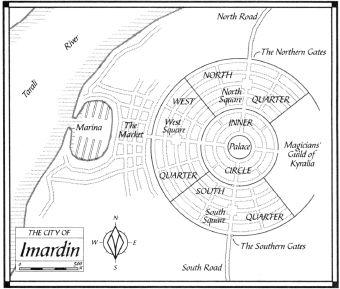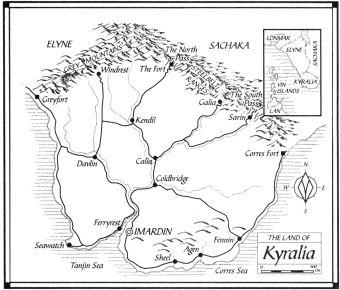The Rogue
Authors: Trudi Canavan
Tags: #Science Fiction, #Magic, #Fantasy, #Young Adult, #Adventure





ONE
1
STONE-MAKERS’ CAVES
According to a Sachakan tradition so old that nobody remembered where it had begun, summer had a male aspect and winter a female one. Over the centuries since their founding, Traitor leaders and visionaries had declared the superstitions relating to men and women – especially women – to be ridiculous, but many of their people still felt that the season that exerted the most control over their lives had many feminine characteristics. Winter was relentless, powerful and brought people together in order to best survive.
In contrast, to occupants of the lowlands and deserts of Sachaka, winter was a blessing, bringing the rains that crops and livestock needed. Summer was harsh, dry and unproduct ive.
As Lorkin hurried back from the Herbery, all he could think was that it was colder than he’d expected in the valley. The chill in the air held a threat of snow and ice. He didn’t feel like he’d been in Sanctuary long enough for winter to be this far advanced. Only a few short months had passed since he’d entered the secret home of the Sachakan rebels. Before then he’d been down on the warm, dry lowlands, fleeing in the company of a woman who’d saved his life.
Tyvara
. Something in his chest tightened in an uncomfortable, yet strangely pleasant way. Lorkin drew in a deep breath and quickened his stride. He was determined to ignore the feeling as resolutely as Tyvara was ignoring him.
I didn’t come here only because I fell in love with her
, he told himself. He’d felt bound by honour to speak in Tyvara’s defence to her people, because she’d saved his life. She’d killed the assassin who had tried to seduce and murder him – but the assassin had been a Traitor, too. Riva had been acting on behalf of a faction that believed he should be punished for the failure of his father, the former High Lord Akkarin, to uphold a deal he’d made with the Traitors many years ago. Nobody within the faction had admitted to giving Riva an order to kill him. To have done so would mean they had acted against the wishes of the queen, so they claimed it had been all Riva’s idea.
There are rebels within the rebels
, Lorkin mused.
His defence of Tyvara may have saved her from execution, but she had not evaded punishment. Perhaps it was the tasks that Riva’s family had set for her that kept her away from him. Whatever the reason, he’d endured the loneliness of a stranger in a foreign place.
He had nearly reached the foot of the cliff wall that surrounded the valley. Glancing up at the multitude of windows and doors carved into this side of the valley, Lorkin knew there would be times he’d feel trapped within this place. Not because of the savage winter, which would make staying indoors necessary, but because, as a foreigner who now knew the general whereabouts of the Traitors’ home, he would never be allowed to leave.
Beyond the windows and doors were enough rooms to house a small city’s populace. They ranged from small cupboard-sized hollows to halls the size of the Guildhall. Most were not cut far into the rock wall, since there had been tremors and collapses in the past and people felt more comfortable living close enough to the outside that they could run outdoors quickly.
Some passages ventured a lot deeper. These were the domain of the Traitor magicians – the women who, despite their claims that this was an equal society, ruled this place. Perhaps they didn’t mind living further underground because they could use magic to prevent being crushed in a collapse.
Or perhaps they like to stay close to the caves where the magical crystals and stones are made.
At that thought, Lorkin felt a tingle of excitement. He shifted the box he was carrying to the other shoulder and strode through the arched entrance to the city.
Perhaps tonight I will find out.
The city passages were busy as workers returned to their families. At one point Lorkin’s path was blocked by the children of two Traitors who had stopped to talk to one another.
“Excuse me,” he said automatically as he squeezed past.
The adults and children looked amused. Kyralian manners puzzled all Sachakans. The Ashaki and their families, the powerful free people of the lowlands, had too great a sense of entitlement to feel the need to express gratitude for the services of others – and thought thanking slaves for doing what they had no choice in doing was ridiculous. Though Traitors did not keep slaves and their society was supposed to be equal, they hadn’t developed a sense of good manners. At first Lorkin had tried to do as they did, but he did not want to lose his habit of being polite to the extent that his own people would find him rude, should he ever return to Kyralia.
Let the Traitors think of me as strange. That’s better than ungrateful or aloof.
Not that Traitors were unfriendly or without warmth. Both men and women had been surprisingly welcoming. Some of the women had even tried to lure him into their beds, but he had declined politely.
Perhaps I’m a fool, but I haven’t yet given up on Tyvara.
Close to the Care Room, the city’s version of a hospice, where he worked most days, he slowed down to catch his breath. It was run by Speaker Kalia, the unofficial leader of the faction that had ordered his execution. He did not want her to think he had hurried back for any reason, or needed to finish his shift on time. If she thought him anxious to leave, she’d find a task to delay him. Likewise, if there wasn’t much to keep him occupied, he knew better than to sit down and rest or Kalia would find him something to do, and often something unpleasant and unnecessary.
Still, if he sauntered in as if he had all the time in the world, she might punish him for that, too. So he adopted his usual calm, stoic demeanour. Kalia saw him, rolled her eyes and took the box from him with magic.
“Why do you never think to use your powers?” she said, sighing and turning away to take the box to the storeroom.
He ignored her question. She wouldn’t want to hear about how Lord Rothen, his old teacher at the Guild, believed that a magician shouldn’t substitute all physical exertion for magic to avoid becoming weak and unhealthy.
“Would you like me to help you with that?” he asked. The box was full of herbs that would be turned into cures – some that he’d like to learn the recipe for.
She glanced back at him and scowled. “No. Keep an eye on the patients.”
He shrugged to hide his frustration and turned to survey the large main room. Not much had changed since the early morning, when he’d begun working for the day. Beds were arranged in rows. Not many were occupied. A few children were recovering from typical childhood illnesses or injuries and an old woman was nursing a broken arm. All were asleep.
It had been Kalia’s idea to put him to work in the Care Room, and he was sure she’d done it to test his resolve to not teach the Traitors how to Heal with magic. So far there had been no patients likely to die from sicknesses or injuries he could only cure with magic, but it was bound to happen eventually. When it did, he expected Kalia to stir up animosity toward him. He had a plan to counter Kalia’s, but behind her motherly appearance and demeanour was a shrewd mind. She may have guessed his intentions already. He could only wait and see.
Right now he couldn’t wait. He needed to be somewhere else. He was late, and getting later every moment that passed, so he followed Kalia into the storeroom.
“Looks like you have a lot of work to do,” he observed.
She didn’t look up at him. “Yes. I’ll be up all night.”
“You didn’t get any sleep last night,” he reminded her. “It’s not good for you.”
“Don’t be stupid,” she snapped, glaring at him. “I’m more than capable of doing without sleep. This has to be done
now
. By someone who knows what they’re doing.” She turned away. “Go. Take the night off.”
Lorkin did not give her a chance to change her mind. He smiled wryly to himself as he slipped out of the Care Room. Guild Healers knew how damaging lack of sleep could be to the body because they could sense the effects. Not knowing how to Heal with magic, Traitors had never sensed their error and believed a good night’s sleep was an unnecessary indulgence.
He hadn’t tried to convince them otherwise, since reminding them of what they didn’t know wasn’t tactful. Many years ago, his father had promised to teach the Traitors to Heal in exchange for the knowledge of black magic, despite not having the approval of the Guild to pass on such knowledge and, more importantly, black magic being forbidden to Guild magicians.
At the time, many Traitor children had caught a deadly disease and knowledge of Healing magic might have saved them. Black magic had allowed Akkarin to escape the Ichani who had enslaved him and return to Kyralia, but he never came back to Sachaka to fulfil his side of the deal. Since learning of his father’s broken promise, Lorkin had considered many possible reasons. His father had known that the brother of the Ichani who had enslaved Akkarin planned to invade Kyralia. He may have felt obliged to deal with that threat first. Perhaps he could not explain the threat to the Guild without revealing that he had learned forbidden black magic. He might have considered it too dangerous to return to Sachaka alone, risking recapture by the Ichani or the vengeance of his former master’s brother.
Perhaps he never intended to uphold the deal. After all, the Traitors had known of his terrible situation for some time before they offered their help, whereas they helped others – mainly women of Sachaka – all the time without asking a price. That they hadn’t helped Akkarin regain his freedom until it was an advantage to them certainly demonstrated how ruthless they could be.
The passages were quieter now, so Lorkin was able to travel faster, breaking into a jog when there was nobody around to observe. If someone from Kalia’s faction noticed he was in a hurry, it might be reported to her.
Life here didn’t quite live up to Tyvara’s claims of a peaceful society – or even a fair one, despite the Traitors’ principles of equality.
Still, they are doing better than many other countries, and especially the rest of Sachaka. They have no slavery, and the work people are given is mostly decided by ability rather than an inherited class system. They may treat men and women unequally, but so do all other cultures – the other way around. Most cultures treat women far worse than the Traitors treat their men.